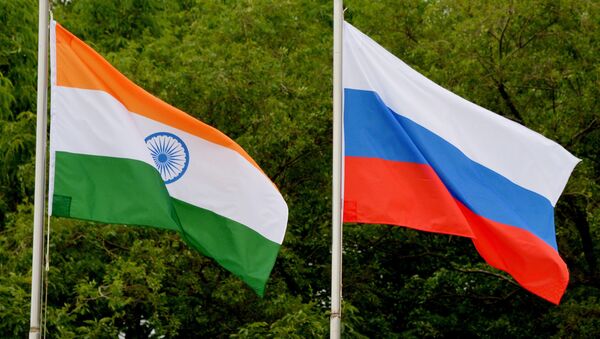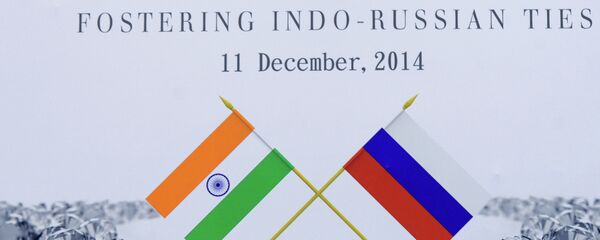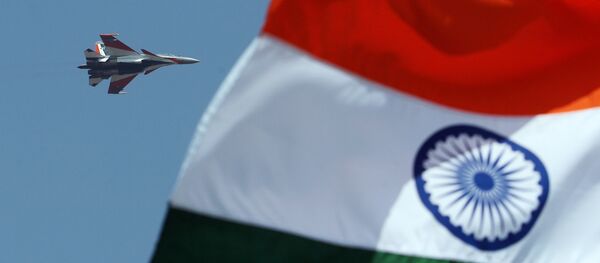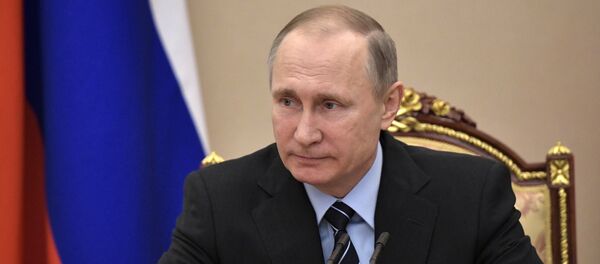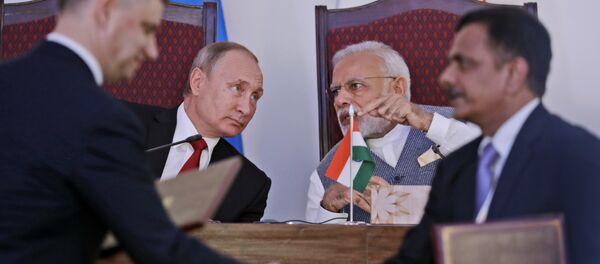NEW DELHI (Sputnik) — India and Russia are marking 70 years of diplomatic relations and years of collaboration, where each has turned — the one a newly-independent nation and the other the victor and emancipator of WWII — into robust economies that respect and invest in each other for mutual benefit and growth.
In the 21st century, India-Russia ties haven't receded into the background but they are still throbbing with vibrancy and vitality in trade. Consider the two-day India-Russia Military-Industrial Conference at the Manekshaw Auditorium in New Delhi. More than 100 Indian private companies, including several small- and medium-scale companies, were enthusiastically participating at the event to mine the next big opportunity. With the Make in India project being a key government plan in India, Russia and Russian companies are more than eager to provide the know-how to technology-starved India.
That has not stopped some voices in the mainstream Indian media from saying how technology transfer could derail future Indo-Russia defense ties; at the event in New Delhi, a neutral observer could have felt the remarkable confidence in Indian industries during the event and afterward.
The governments of India and Russia also admitted to mischief by ‘unfriendly forces' and ‘unfriendly actors'. On March 24, Indian Home Minister Rajnath Singh met a nine-member Russian delegation led by the Director of the Federal Security Service (FSB) of the Russian Federation, Alexander Bortnikov. "The two sides also acknowledged that there may be some ‘unfriendly forces' or ‘unfriendly actors' who may be trying to create hindrances in the bilateral relationship, but such adverse campaigns are incapable of affecting the deep understanding bolstered by regular dialogues and mutual cooperation," an official statement put out after the meeting.
"Transfer of technology in various forms has always been an important element in India's defense purchases from Russia and the erstwhile USSR. We have been manufacturing tanks, aircraft, and ammunition for a long time in our public sector undertakings and ordnance factories with the help of Russia," says Amit Cowshish, former financial adviser to the Indian Ministry of Defense.
Experts said it should not be viewed as a change in approach by Russian firms in the changed global geopolitical landscape.
"Russia has been extremely forthcoming in transferring sensitive defense technology to India with minimal strings, unlike the US, France and Israel. Russian help in building nuclear submarines is a case in point," said Vijainder K. Thakur, a defense analyst and former squadron leader.
Transfer of Technology Can't Make Up for Historically Low R&D Investment
HAL and India's Defense Research and Development Organization (DRDO) didn't get to imbibe the transferred technology because of the inadequate R&D investments by Indian industry in the country's defense industrial base. While global companies were spending some 20 percent of their turnover on R&D, HAL and DRDO got a mere five percent. Look at the tilted scale!
"The problem with HAL and DRDO is their inability to build on the technology transferred to them, or indeed to imbibe it! Russia has been far more forthcoming than Western countries in giving India access to its defense technology, and cannot be faulted for the failure of HAL and other public sector organizations to build upon the technology that it has transferred," Thakur said.
He hasn't given up hope, though.
"Increased Russian investment in defense-related Indian industries, through local manufacture in India of Russian spares and Line Replaceable Units, will enable India to better imbibe and leverage Russian ToT," Thakur said.
All That Glitters Is Not Gold or Are You Being Sold Redundant Tech in Transfer?
France and Israel are willing to share second-line defense technology with India for commercial gains after India cemented its strategic partnership with the US. "US ToT, like its weapon sales, would also be confined to second-line technology, but come with strings attached and the possibility of a future sanctions regime. As long as Russia can offer technology at par with, or better than, France and Israel at a more competitive cost, it will continue to be favored by India," pointed out Thakur.
"It would be naive to expect foreign companies to share critical technologies with India, unless there are compelling commercial reasons for doing so or this is a part of the larger strategic partnership between India and the country concerned," said Amit Cowshish.
Not Everything is for Sale, Even at a Higher Price
"Take the case of the Kamov Ka-226T helicopter. Kamov is a world leader in contra-rotating helicopter technology. Were it to transfer the coveted technology to HAL and private sector firms in India, its commercial interests would be heavily compromised. Russia could forever lose its edge in contra-rotating helicopters if the associated technology was to be leaked via the Indian private sector to the West and China," Thakur said.
It is hoped the promise made at the India-Russia Military Industrial Conference will provide more visibility to Russian aerospace manufacturers in India, like Boeing, Lockheed Martin and Saab, through tie-ups with local industry for the manufacture of aerostructures, LRUs and spares.
At present, Russia has the perception crisis in India to its disadvantage. The Indian media is often seen leaning towards the western world, leaving Russia room to work the Indian media more, something which it has started doing.
One cannot but be steadfast in not refusing to let a tie of 70 years be forgotten in vicious propaganda by ‘unfriendly actors' and ‘unfriendly forces' operating via the Indian media.
